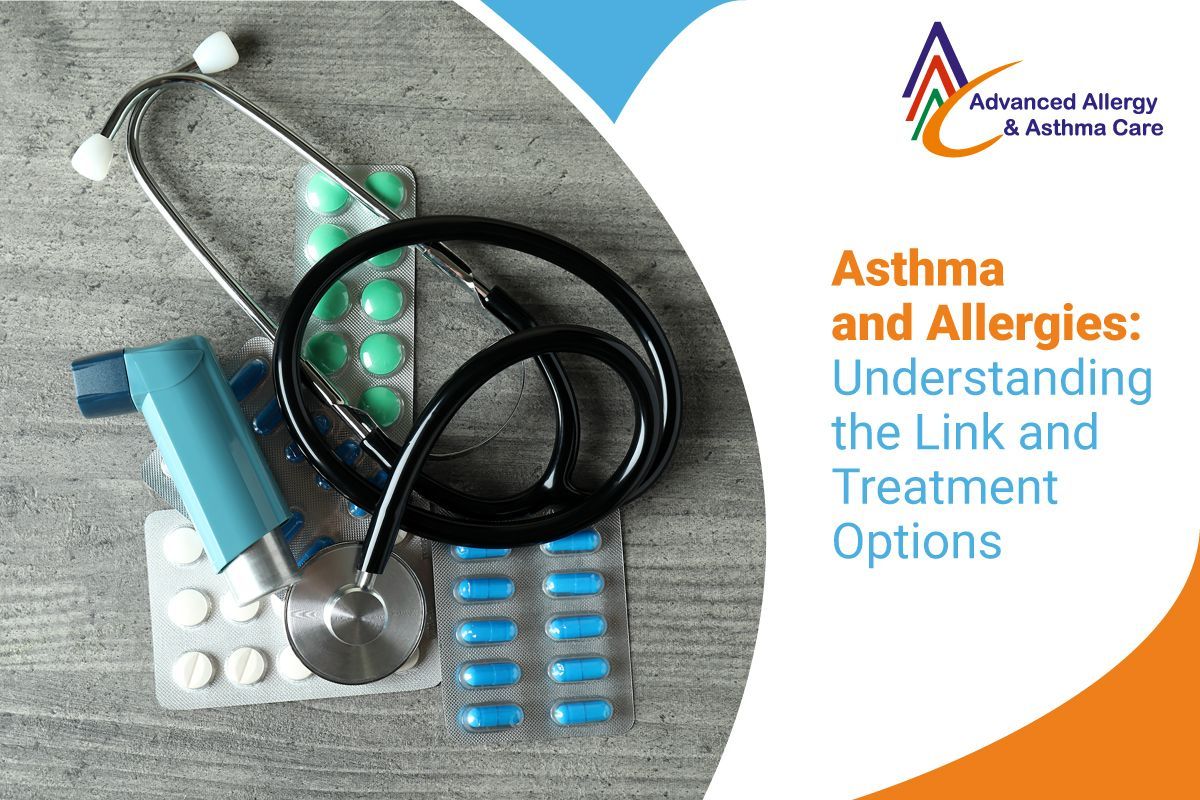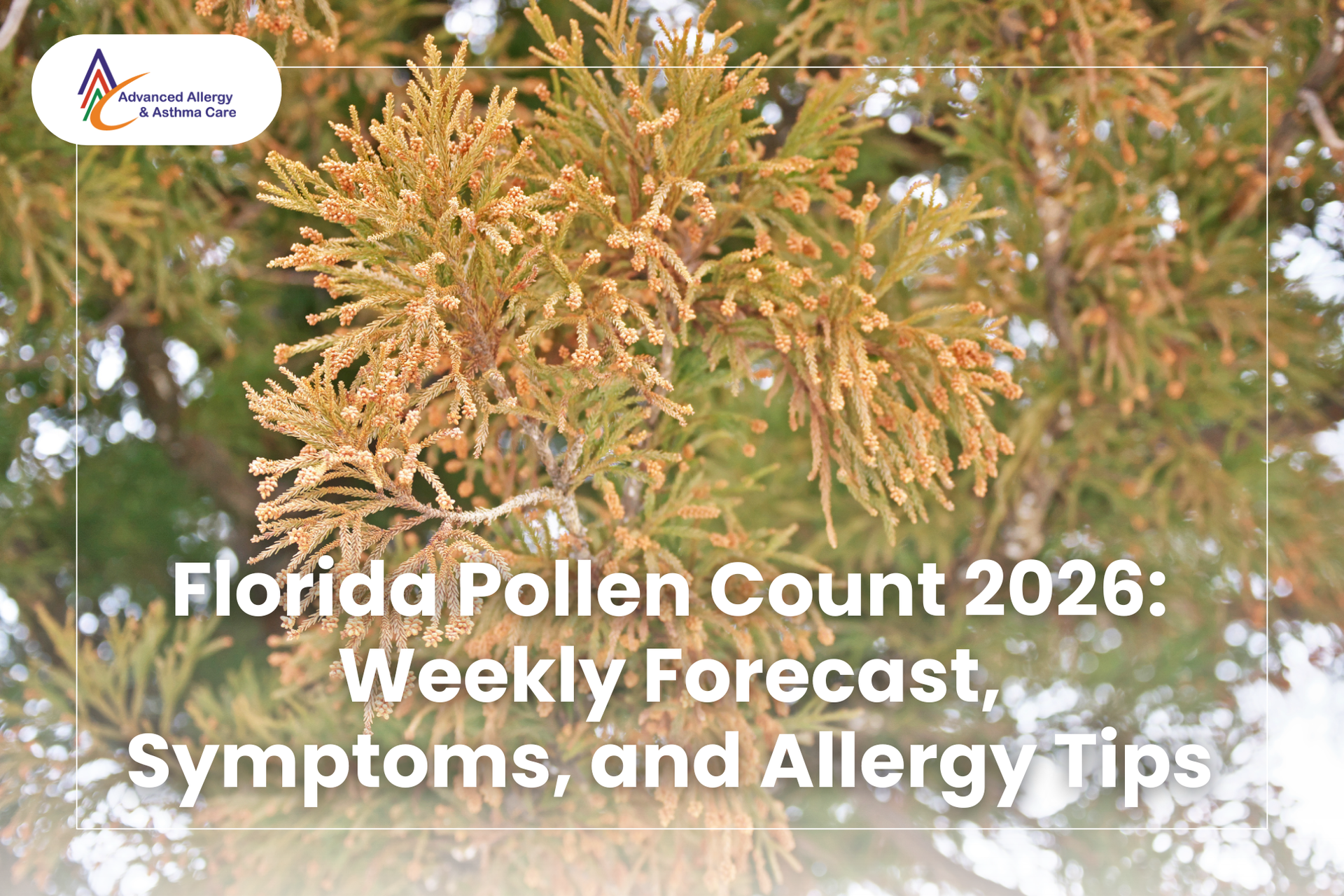Understanding the intricate link between asthma and allergies is crucial in an increasingly respiratory health-conscious world. These conditions frequently overlap, sharing symptoms and treatment strategies. If you've ever pondered the connection between asthma and allergies or sought effective management options, you're in the right spot.
This blog will explore the connection between asthma and allergies and discuss various
allergic asthma treatment options. We aim to empower you with knowledge, equipping you with the tools to navigate your respiratory health journey with confidence and control.
Can Allergies Cause Asthma?
Yes, allergies can indeed cause asthma. Numerous studies and statistics support the link between allergies and the development or exacerbation of asthma symptoms. According to the
American Academy of Allergy, Asthma & Immunology (AAAAI), approximately 60 to 80 percent of individuals with asthma also have allergies. A study published in the Journal of Allergy and Clinical Immunology found that individuals with allergic rhinitis (hay fever) are more likely to develop asthma compared to those without allergies.
One study published by the Journal of Allergy and Clinical Immunology concluded that allergic rhinitis poses a significant health concern and impacts up to 40% of the global population. Among
allergic rhinitis patients, 40% also suffer from asthma, while as many as 94% of individuals with allergic asthma experience allergic rhinitis.
Asthma and allergies are two conditions often discussed in the same breath. They are both related to the
respiratory system and share many common symptoms. However, many people need to know the link between these two conditions.
What is Asthma?
Asthma is a long-term respiratory condition affecting millions of individuals worldwide. It is known to cause inflammation and narrowing of the airways, making airflow in and out of the lungs difficult. Asthma symptoms include wheezing, shortness of breath, chest tightness, and coughing. Various factors can trigger these symptoms, including allergens, exercise, stress, and cold air.
Asthma is a lifetime condition, and there is no cure for it. However, people with asthma can lead active, healthy lives with proper management.
Asthma treatment typically involves inhalers, which deliver medication directly to the lungs. These drugs reduce inflammation in the airways and relax the muscles around them, making breathing easier.
What are Allergies?
Allergies are a hypersensitive reaction of your body's natural defenses to a particular substance known as an allergen. Common allergens include pollen, dust mites, pet dander, mold, and certain foods. Suppose you have allergies and come into contact with an allergen. In that case, your immune system overreacts by releasing
histamines, which cause inflammation and other allergy symptoms. These symptoms include sneezing, runny nose, itchy eyes, and skin rash.
Allergies are common, affecting around 50 million people in the United States alone. They can range from mild to severe and can be life-threatening in some cases. Treatment for allergies typically involves avoiding the allergen if possible and using medication to control symptoms.
Decongestants, antihistamines, and nasal sprays are commonly used to treat allergies.
Asthma vs Allergies: Understanding the Link
Allergies and asthma are closely linked. In fact, according to the
Asthma and Allergy Foundation of America, many people with asthma also have allergies. This is because allergens are a common trigger for asthma symptoms. When a person with asthma gets accidentally exposed to allergens, it can cause inflammation in the airways, making breathing difficult, and allergy asthma symptoms typically follow.
In addition to triggering asthma symptoms, allergies can cause asthma allergies to develop in some people. This is known as allergic asthma and is more common in children than adults. In allergic asthma, exposure to an allergen triggers an immune response leading to airway inflammation. Over time, this inflammation can cause permanent changes to the airways, making them more sensitive and prone to allergic asthma symptoms.
Treatment Options for Asthma and Allergies
The treatment options for asthma and allergies are similar, as both conditions involve inflammation and narrowing of the airways. Treatment aims to reduce inflammation and open the airways, making breathing easier.
The section below summarizes the treatment options for asthma-induced allergies.
Medications
Medications are the most common treatment for asthma and allergies. Inhalers are often used to deliver medication directly to the lungs, where they can reduce inflammation and relax the muscles around the airways. Antihistamines,
decongestants, and nasal sprays are also commonly used to treat allergies.
Allergen Immunotherapy
Allergen immunotherapy (allergy shots) is a treatment option for people with severe allergies. This involves injecting small amounts of an allergen under the skin, gradually increasing the dose. The goal is to increase your body's natural tolerance against the condition gradually.
Lifestyle Changes
In addition to medication, several lifestyle changes can help manage asthma and allergy symptoms. For example, avoiding triggers such as pollen, dust, and pet dander can help reduce the severity of your symptoms. Keeping your home clean and dust-free can also be helpful, as can investing in air purifiers or other devices that can help remove allergens from the air.
Regular Exercise
Regular exercise can also be beneficial for managing asthma and allergies. However, talking to your healthcare provider before starting any new exercise regimen is essential. Allergists can determine which types of exercise are safe for you. They may even recommend specific activities that can help improve your breathing.
What to Expect During an Allergy Consultation
You can expect a comprehensive evaluation and discussion of your concerns during an allergy consultation. Your allergist typically starts with taking a detailed medical history, asking about your symptoms, their duration, and any triggers you have identified. They usually inquire about your lifestyle, occupation, and any potential allergens you come into contact with regularly. Moreover, a physical examination may focus on the areas affected by your allergies. Allergy testing, such as skin prick tests or blood tests, may be performed to identify specific allergens.
Your allergist will provide an accurate diagnosis and recommend appropriate treatment options based on the gathered information. This may include avoidance strategies, medications, or immunotherapy. The consultation offers an opportunity for you to ask questions and better understand your allergies, helping you manage them effectively in your daily life.
Live Life to the Fullest Allergy and Asthma-Free!
We understand the challenges of asthma and allergies. That's why we are here for you and your family. If you’re looking for an answer to the question: is allergy and asthma related? You are on the right track.
Our
board-certified allergists offer top-quality treatment options for asthma and allergies using innovative and conventional techniques. We aim to help you reach a better lifestyle free of risks from these conditions.
If you want to regain control of your life over asthma and allergies, call us today! Dial (727) 544-8100 or (813) 476-3394 to book an appointment.
We guarantee quality care topped with compassion and professionalism. At
Advanced Allergy and Asthma Care, you and your family always come first.









